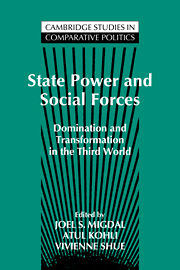Book contents
- Frontmatter
- Contents
- Preface
- List of contributors
- State Power and Social Forces
- Introduction: developing a state-in-society perspective
- PART I THEORETICAL AND METHODOLOGICAL CONSIDERATIONS
- PART II STATES: EMBEDDED IN SOCIETY
- 2 Traditional politics against state transformation in Brazil
- 3 State power and social organization in China
- 4 Centralization and powerlessness: India's democracy in a comparative perspective
- 5 States and ruling classes in postcolonial Africa: the enduring contradictions of power
- PART III SOCIAL FORCES: ENGAGED WITH STATE POWER
- PART IV CONCLUSION
- Index
5 - States and ruling classes in postcolonial Africa: the enduring contradictions of power
Published online by Cambridge University Press: 05 June 2012
- Frontmatter
- Contents
- Preface
- List of contributors
- State Power and Social Forces
- Introduction: developing a state-in-society perspective
- PART I THEORETICAL AND METHODOLOGICAL CONSIDERATIONS
- PART II STATES: EMBEDDED IN SOCIETY
- 2 Traditional politics against state transformation in Brazil
- 3 State power and social organization in China
- 4 Centralization and powerlessness: India's democracy in a comparative perspective
- 5 States and ruling classes in postcolonial Africa: the enduring contradictions of power
- PART III SOCIAL FORCES: ENGAGED WITH STATE POWER
- PART IV CONCLUSION
- Index
Summary
INTRODUCTION
Goran Hyden remarked that postcolonial African states appear to be “suspended balloon-like in mid-air.” Much of the literature on African states conveyed similar images. Both modernization theory and dependency-underdevelopment approaches emphasized the external sources or superimposed character of political power in contemporary Africa. Concepts like “Westernized elite,” “auxiliary bourgeoisie,” and “overdeveloped postcolonial state” underscored the extent to which contemporary states and forms of domination were grafted onto African societies. Assumptions about state autonomy went hand in hand with the notion that the most fundamental sources of state power were external, rather than rooted in African society. Implicit in modernization theory was a belief in near absolute autonomy of the political sphere, and in the capacity of the new political elite of tropical Africa to reshape societies in their own image. Political economists challenged modernization theorists' notion of state autonomy by pointing to neocolonialism and dependency. Underdevelopment theorists argued that African ruling classes enjoyed little autonomy vis-à-vis neocolonial interests and little autonomy to act in ways that systematically violated the logic of global capital. Yet dependency and underdevelopment theorists, like modernization theorists, tended to view postcolonial states and ruling classes as remarkably unconstrained by the societies over which they sought to preside.
On the basis of such a view, many political economists argued that over time, Africa's ruling elite would entrench and guarantee their own power by transforming themselves into capitalist classes. Some form of peripheral capitalism or dependent development would serve Africa's ruling classes (and international capital) better than chronic economic stagnation.
- Type
- Chapter
- Information
- State Power and Social ForcesDomination and Transformation in the Third World, pp. 108 - 140Publisher: Cambridge University PressPrint publication year: 1994
- 30
- Cited by

